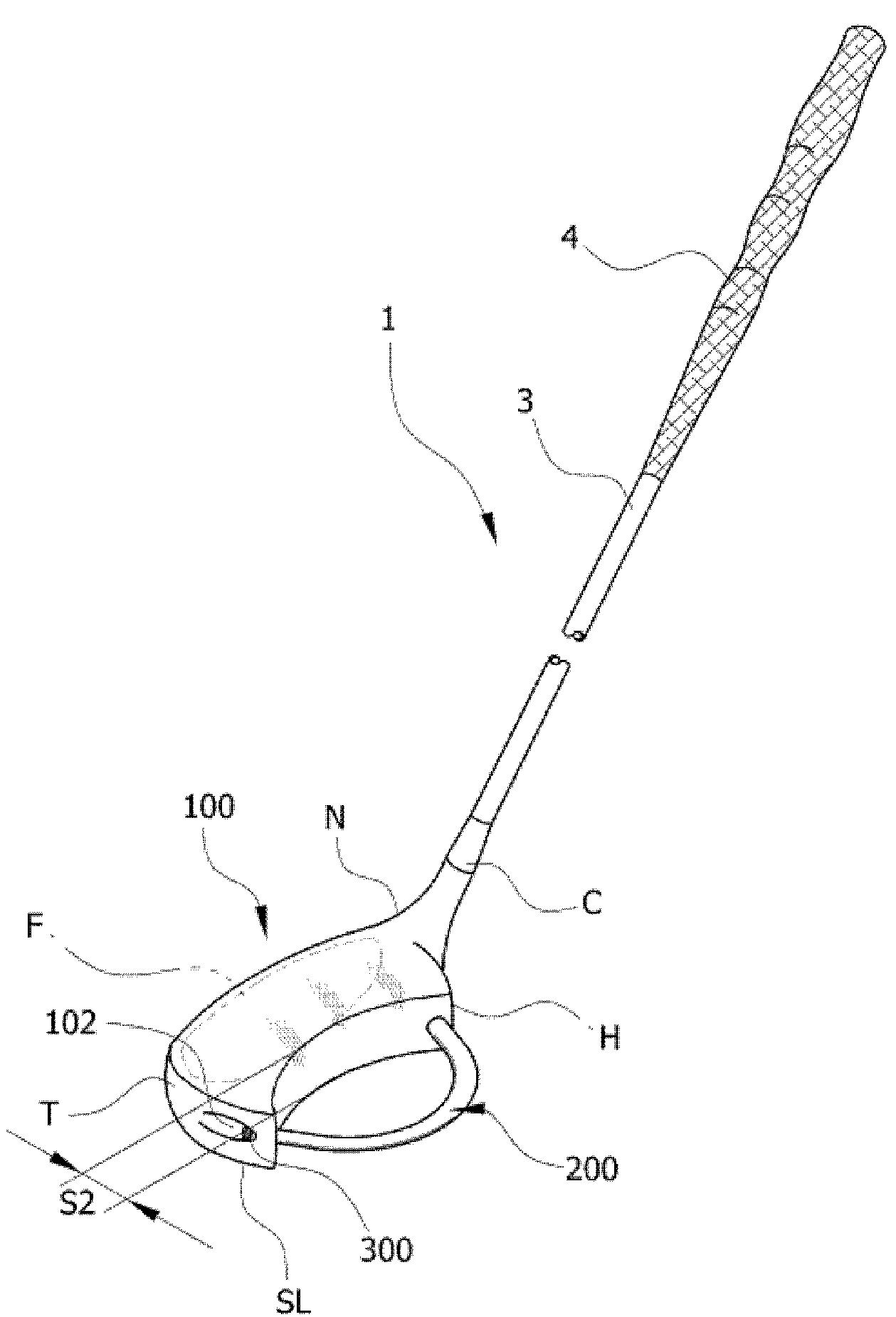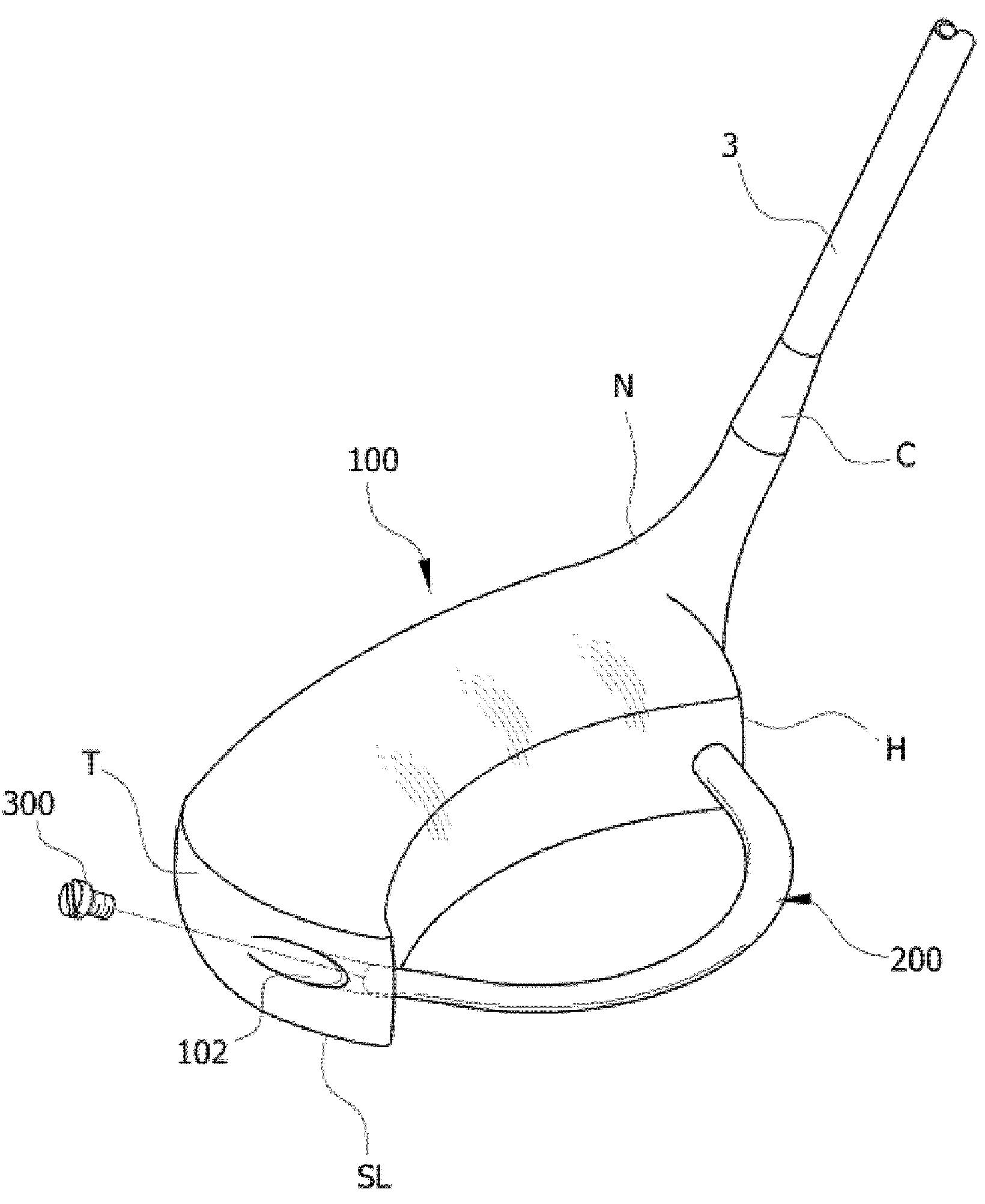Interesting Driver Designed to Prevent Hooks and Slices… Think It Will Make It To The Market?
Check out this driver….



These drawings are from a patent application that recently published as US Pub. No. 20080171610 titled “Golf Club for Preventing Hook and Slice” and describes the invention as:
Disclosed therein is a golf club for preventing a hook and a slice, which can allow a golfer to easily control the golf club while swinging the golf club since a sole progression having a side width extending backwardly from a club head face and a sole plate having a bottom area are formed small by cutting a part of the rear side of a club head, thereby preventing the hook and slice due to a light weight of the club head and minimization of a frictional area between the ground and the club head.
The application goes on to explain the following (some of which I am not buying):
[0005] In general, golf clubs are classified into drivers used for longer shots and irons used to propel a golf ball to approach a hole. As shown in FIG. 1, such a golf club 1 includes a club head 2, a shaft 3 extended from the club head 2, and a grip formed on an end of the shaft 3 to allow a golfer to grasping the golf club 1.
[0006] The golf club 1 has a structure that the club head 2 with a heavy weight is connected to an end of the shaft 3, wherein a weight center of the club head 2 and a sweet spot of a club head face (F) are deviated from an extension line of the shaft 3. When the golfer hits the golf ball using the golf club 1, strength of inertia is varied according to a weight of the club head 2, and it causes backward bending and twisting of the shaft 3 of the golf club 1. When the backward bending and twisting of the shaft 3 are caused by the weight of the club head 2, the club head face (F) of the club head 2 is not at a right angle to the golf ball but opened toward the outside or the inside.
[0007] That is, when the golf ball is located on the club head face (F) at the right angle, the golfer can hit the golf ball to a wanted location, and so, a driver distance is also increased. However, to accurately hit the golf ball to the wanted location and distance, after the golfer grasps the golf club 1, the golfer swings the golf club 1 in such a manner as to remove the bending and twisting of the shaft 3 of the golf club 1 by converting an acceleration motion into a uniform motion of the club head 2 on a swing plane at a time point that the club head 2 hits the golf ball on the swing plane of the golf club 1.
[0008] Next, to hit the golf ball to the wanted location and distance, the golfer locates the club head face (F) of the club head 2 to be a right angle to a wanted direction. However, it is difficult, even for skilled professional golfers, to exactly know the time that the club head 2 of the golf club 1 hits the golf ball, and so, it is more difficult for amateur golfers. Therefore, many golfers are in anguish about a hook and a slice, which are caused by the bending and twisting of the shaft 3 according to the weight of the club head 2.
[0009] In addition, as shown in FIG. 1, since the golf club 1 according to the prior art has a wide sole plate 5, which is a bottom area SL1 of the club head 2, and a wide sole progression 6, which is a side width S1 of the sole plate 5, when the golfer swings the golf club 1, a friction force is increased due to a friction area to the ground and the sole plate 5 and the sole progression 6 are formed largely, so that the weight of the club head 2 is increased and the bending and twisting of the shaft 3 are frequently generated when the amateur golfer swings the golf club 1, whereby a unstable swing motion is made. Therefore, it is obvious that the hook and the slice are frequently generated due to the bottom area SL1 of the sole plate 5 and the weight of the club head 2 when the amateur golfer who uses the golf club of the prior art 1 swings the golf club 1.
[0010] For your understanding, the hook and the slice will be described in brief. First, the hook describes a ball flight in which the golf ball curves from the right to the left due to a counterclockwise rotation thereof, and frequently occurs in case where the club head hits the golf ball while moving from the inside to the outside when an impact is generated due to the golfer’s swing motion.
[0011] In the meantime, the slice describes a ball flight in which the golf ball curves severely to the right of the line of flight since it bends to the right, and occurs in case where the club head hits the golf ball from the outside to the inside when an impact is generated due to the golfer’s swing motion. So, the hook and the slice are problems that many golfers must solve.
[0012] In other words, if the time point to stop acceleration for the impact is early when the golfer swings the golf club to hit the golf ball, the club head of the golf club is shut and the hook occurs. On the contrary, if the time point to stop acceleration is late or acceleration is not stopped, the club head is opened and the slice occurs, so that out-of-bound in which the golf ball flies highly and misses its target (hole) while bending to the right.
[0013] Therefore, to solve such problems of the hook and slice, many golfers make efforts to minimize the hook and the slice through a posture correction and various methods, and so, various posture-correcting devices and golf clubs have been disclosed. However, such posture-correcting devices are very expensive, but do not greatly prevent occurrence of the hook and slice. Moreover, various golf clubs have been disclosed, but still have the problem in that the hook and slice frequently occur since there is a restriction in lightening of the weight of the club head due to a problem related with the driver distance generated when the golfer hits the golf ball.
[0014] Of course, not only the amateur golfers but also the professional golfers suffer from the occurrence of the hook and slice. The professional golfers can solve the problems of the hook and slice somewhat only by selecting the golf club suitable to his or her own self needless to greatly concern about selecting the golf club. However, the amateur golfers may experience a severe difference in occurrence of the hook and slice according to the selection of the golf club. So, many golfers need a golf club which can greatly prevent occurrence of the hook and slice.
[0006] The golf club 1 has a structure that the club head 2 with a heavy weight is connected to an end of the shaft 3, wherein a weight center of the club head 2 and a sweet spot of a club head face (F) are deviated from an extension line of the shaft 3. When the golfer hits the golf ball using the golf club 1, strength of inertia is varied according to a weight of the club head 2, and it causes backward bending and twisting of the shaft 3 of the golf club 1. When the backward bending and twisting of the shaft 3 are caused by the weight of the club head 2, the club head face (F) of the club head 2 is not at a right angle to the golf ball but opened toward the outside or the inside.
[0007] That is, when the golf ball is located on the club head face (F) at the right angle, the golfer can hit the golf ball to a wanted location, and so, a driver distance is also increased. However, to accurately hit the golf ball to the wanted location and distance, after the golfer grasps the golf club 1, the golfer swings the golf club 1 in such a manner as to remove the bending and twisting of the shaft 3 of the golf club 1 by converting an acceleration motion into a uniform motion of the club head 2 on a swing plane at a time point that the club head 2 hits the golf ball on the swing plane of the golf club 1.
[0008] Next, to hit the golf ball to the wanted location and distance, the golfer locates the club head face (F) of the club head 2 to be a right angle to a wanted direction. However, it is difficult, even for skilled professional golfers, to exactly know the time that the club head 2 of the golf club 1 hits the golf ball, and so, it is more difficult for amateur golfers. Therefore, many golfers are in anguish about a hook and a slice, which are caused by the bending and twisting of the shaft 3 according to the weight of the club head 2.
[0009] In addition, as shown in FIG. 1, since the golf club 1 according to the prior art has a wide sole plate 5, which is a bottom area SL1 of the club head 2, and a wide sole progression 6, which is a side width S1 of the sole plate 5, when the golfer swings the golf club 1, a friction force is increased due to a friction area to the ground and the sole plate 5 and the sole progression 6 are formed largely, so that the weight of the club head 2 is increased and the bending and twisting of the shaft 3 are frequently generated when the amateur golfer swings the golf club 1, whereby a unstable swing motion is made. Therefore, it is obvious that the hook and the slice are frequently generated due to the bottom area SL1 of the sole plate 5 and the weight of the club head 2 when the amateur golfer who uses the golf club of the prior art 1 swings the golf club 1.
[0010] For your understanding, the hook and the slice will be described in brief. First, the hook describes a ball flight in which the golf ball curves from the right to the left due to a counterclockwise rotation thereof, and frequently occurs in case where the club head hits the golf ball while moving from the inside to the outside when an impact is generated due to the golfer’s swing motion.
[0011] In the meantime, the slice describes a ball flight in which the golf ball curves severely to the right of the line of flight since it bends to the right, and occurs in case where the club head hits the golf ball from the outside to the inside when an impact is generated due to the golfer’s swing motion. So, the hook and the slice are problems that many golfers must solve.
[0012] In other words, if the time point to stop acceleration for the impact is early when the golfer swings the golf club to hit the golf ball, the club head of the golf club is shut and the hook occurs. On the contrary, if the time point to stop acceleration is late or acceleration is not stopped, the club head is opened and the slice occurs, so that out-of-bound in which the golf ball flies highly and misses its target (hole) while bending to the right.
[0013] Therefore, to solve such problems of the hook and slice, many golfers make efforts to minimize the hook and the slice through a posture correction and various methods, and so, various posture-correcting devices and golf clubs have been disclosed. However, such posture-correcting devices are very expensive, but do not greatly prevent occurrence of the hook and slice. Moreover, various golf clubs have been disclosed, but still have the problem in that the hook and slice frequently occur since there is a restriction in lightening of the weight of the club head due to a problem related with the driver distance generated when the golfer hits the golf ball.
[0014] Of course, not only the amateur golfers but also the professional golfers suffer from the occurrence of the hook and slice. The professional golfers can solve the problems of the hook and slice somewhat only by selecting the golf club suitable to his or her own self needless to greatly concern about selecting the golf club. However, the amateur golfers may experience a severe difference in occurrence of the hook and slice according to the selection of the golf club. So, many golfers need a golf club which can greatly prevent occurrence of the hook and slice.
Interesting design, but I have the feeling I have seen similar driver designs before (not too mention putter designs).
Dave Dawsey – Keepi
ng an Eye on Golf Technology
PS – click here to check out other driver and wood design posts
